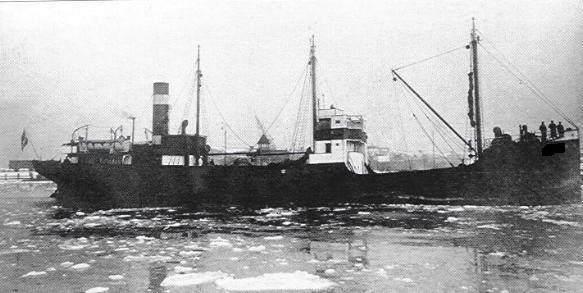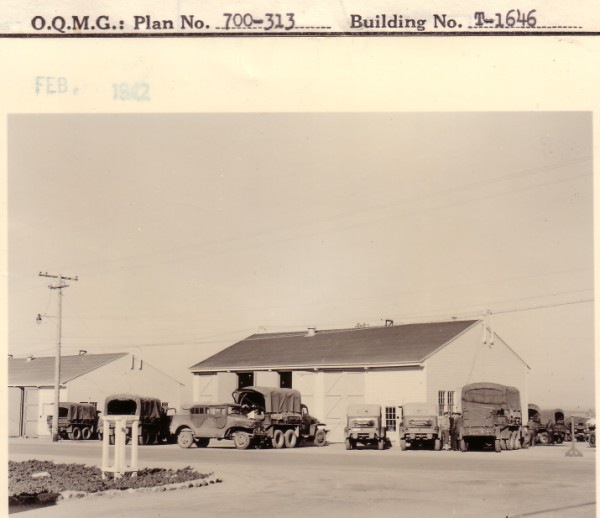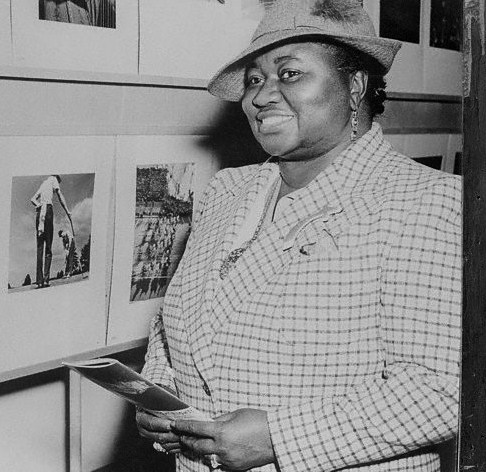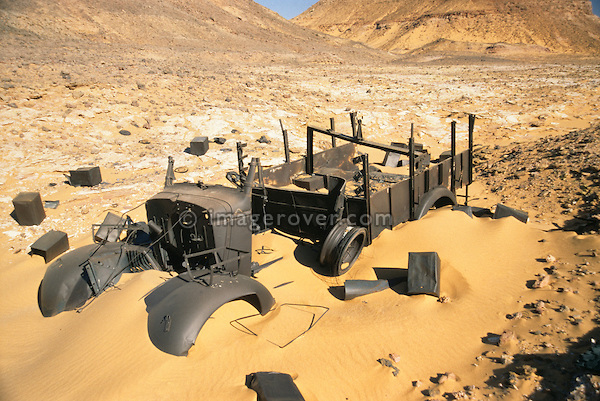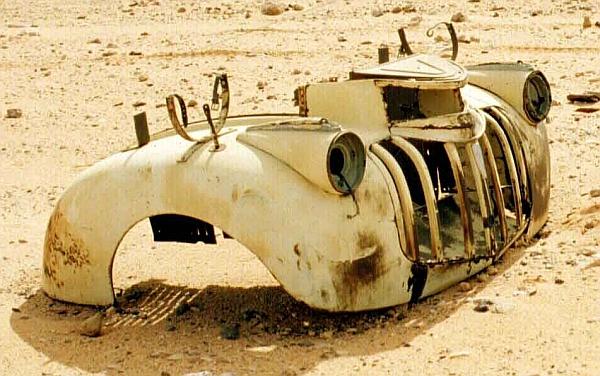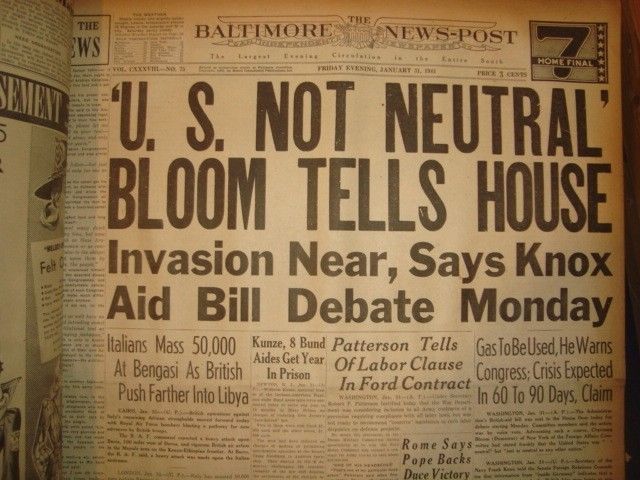Wednesday 9 April 1941
 |
| The Berlin Opera House on the Unter den Linden burns from the bombing of 9 April 1941. Hitler orders it completely repaired. |
We inform all civilized peoples of the frightful crimes committed by the German armed forces in the war imposed upon us. Belgrade, the capital of our country, which in good time was proclaimed an open and undefended city, was bombed by German aircraft without a declaration of war.... Never during the long history of this martyr city were such cruelties committed even by the most primitive invaders.... Horrible scene occurred during the bombardment when German planes machine-gunned women and children fleeing from their burning homes. Flying low, the German bombers turned houses into hecatombs.Deutschland Radio is more pithy, reporting:
Belgrade is still burning.Meanwhile, the Germans continue advancing without too much opposition. In southern Yugoslavia, Field Marshal List's forces have cut the main railway line between Belgrade and Thessalonica (Thessaloniki). They are proceeding west for a junction with the Italians in Albania and have crossed the Vardar River. Today, advance detachments are in the vicinity of Veles, Macedonia. The 11th Panzer Division is in Nis.
The Yugoslav General Staff issues a communique stating that "We have succeeded in halting all attacks and have in part repulsed them."
A bit further south, in Greece, the German XVIII Mountain Corps (Lt. Gen. Franz Böhme) and 30 Corps (Lt. Gen. Otto Hartmann) troops advancing south from Bulgaria lunge forward. At the corner where Yugoslavia, Greece, and Bulgaria meet, the German 2nd Panzer Division pushes aside the Yugoslav units guarding the Greek left flank. This opens a seam south from Dojran Lake for the panzers to race down and take Thessalonica (south of the border mountains, it is flat and almost desert-like flat scrubland). This cuts off the several Greek divisions to the east from the British troops manning the Aliakmon River line just to the west. In essence, the river itself separates the British and the German forces, and during the day a small Wehrmacht patrol tries to cross the river but is fired upon by New Zealand troops.
 |
| The LA Times headline, 9 April 1941, "Hitler Army Perils Salonika." |
Lieutenant General Konstantinos Bakopoulos, commanding the Eastern Macedonia Army Section, orders isolated Greek fortresses behind the German lines to surrender. Some do, and some don't. Either way, the troops in them now have no hope of avoiding capture. Greek resistance east of the Axios River effectively ends today. Already, the British and Greeks are considering withdrawing from the Aliakmon Line.
The Germans on the other side of the Aliakmon River River are not even the biggest problem facing the British. The German forces in Yugoslavia already are in a position to turn south through the Monastir Gap, advance along the Florina Valley and surround the British standing on the Aliakmon River Line. Australian General Blamey detaches the 1st Armoured Brigade, places it under the command of Australian General Mackay, and sends it north to the Monastir Valley to serve as a block. Mackay's forces take up positions in the narrowest part of the Monastir Valley, where the valley narrows to 500 yards or less.
To the west, the Yugoslav 3rd Army continues advancing away from the Germans into Albania. The Zetska Division reaches the vicinity of Shkodër and the Yugoslav cavalry reaches the Drin River. Some Yugoslav units of the Kosovka Division are blocked by Wehrmacht troops which have advanced northwest from Skopje to Prizren. The Yugoslav Air Force gets some bombers in the air, and they bomb the Italians on the Drin and Buene Rivers, but not the Germans who pose a much bigger threat.
British Prime Minister Winston Churchill announces the capture of Massawa and the loss of Thessaloniki in a speech to the House of Commons. He also attempts to minimize both affairs, stating:
Once we have gained the Battle of the Atlantic and are sure of the constant flow of American supplies which are being prepared for us, then, however far Hitler may go or whatever new millions and scores of millions he may lap in misery, we who are armed with the sword of retributive justice shall be on his track.Visiting Australian Prime Minister Robert Menzies notes that Churchill's speech is:
Not a good speech. He was earth-bound and hesitating, and failed to electrify the House. But even then managed a good phrase, "and then the sword of retribution in our hands, we shall be after him!"Churchill obviously knew that Massawa was captured before today, but decided to delay his announcement of that victory to ease the pain of the defeat in Greece - an indication that he knows things are going poorly elsewhere.
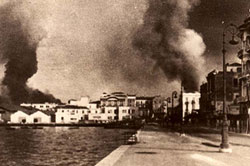 |
| Smoke over Thessalonica, Greece, 9 April 1941. |
Other RAF bombers attack Brest again after dark. They drop 25 tons of 227 kg Ap bombs, four of which hit the heavy cruiser Gneisenau on the starboard side of the forward superstructure. There are 72 dead and 90 wounded on the Gneisenau, with another 18 of the wounded to perish. The bombs cause some structural issues which must be corrected. This attack, more than any other, removes Gneisenau from participation in Operation Rheinübung, the Atlantic sortie by battleship Bismarck and cruiser Prinz Eugen.
In addition, the RAF conducts Rhubarb operations over France during the day. This leads to the loss of a Spitfire to Hptm. Josef Fözö of II./JG 51 around noontime.
The Luftwaffe attacks Birmingham with 237 bombers which drop 285 tons of bombs, including 1110 incendiaries. The Luftwaffe loses four Heinkel He 111s to two RAF Squadrons, No. 151 (Hurricanes) and 264 (Defiants). The Luftwaffe gradually is improving its night-fighter capabilities. Another Luftwaffe attack on the Newcastle/Tynemouth coastline region causes extensive damage, with 116 bombers dropping 152 tons of high explosives and incendiaries.
 |
| A pilot M2 Half-Track Car at the Aberdeen Proving Ground, Aberdeen, Maryland. 9 April 1941. |
 |
| German officers arrive at Anatolia College in Thessaloniki, Greece on 9 April 1941. They are commandeering the premises for use as their Balkan headquarters. |
U-98 (Kptlt. Robert Gysae), on its first patrol sailing out of Kiel, stalks Convoy HX 117. Gysae sinks 1304 ton Dutch freighter Prins Willem II. There are twelve deaths.
German raider Kormoran sinks 8022-ton British freighter Craftsman about midway between Africa and Brazil at their closest point. There are 6 deaths, and 43 are taken as prisoners.
The Luftwaffe bombs and sinks 1600 ton British freighter Dudley Rose out to sea off Berry Head. Everyone survives.
The Luftwaffe also bombs 5187-ton Norwegian tanker Buesten off Berry Head. There are 28 deaths.
The Luftwaffe bombs and damages 812-ton Norwegian freighter Bjornvik off Berry Head. The Bjornvik makes it to Dartmouth, but a delayed action bomb explodes within the ship there, wrecking it. There is one death.
The Luftwaffe attacks Harwich and bombs the 409-ton auxiliary minesweeper HMS Marmion. The captain beaches the Marmion on Harwich Hard and it eventually is towed to Tilbury for scrap.
The Luftwaffe also bombs and sinks 126-ton British examination ship D'Arcy Cooper at Harwich. There are three deaths.
The Luftwaffe bombs and sinks British launch Falcon at Harwich.
The Luftwaffe bombs and damages 6991-ton British tanker British Statesman off Harwich. The British Statesman makes it to port.
The Luftwaffe bombs and damages 4159-ton British freighter Pandorian off Duncansby Head. The Pandorian makes it to port.
The Luftwaffe bombs and sinks British fireboat Queen at Ipswich. It is later raised and returned to service. Two other fire floats at Ipswich, Alert and Greta, also are badly damaged and written off.
The Luftwaffe bombs motor lifeboat John Pyemont of the Royal National Lifeboat Institution at Tynemouth - it is in the boathouse, which is bombed and wrecked.
The Luftwaffe bombs and damages 622-ton British freighter Kylegorm four miles off St. Anne's Head. A tug brings the Kylegorm to Milford Haven.
The Luftwaffe attacks Convoy EC-4 off Keiss, Scotland and damages 6994-ton British tanker British Workman. The British Workman makes it to port at Kirkwall.
The Luftwaffe bombs and damages 1516-ton British freighter Aberhill along the coast southeast of Hartlepool. The Aberhill makes it to Leith.
British 6363-ton tanker Lunula hits a mine at Shellhaven jetty at Thames Haven and is badly damaged. A tug sent to tow it also hits a mine and has to be beached. 28 men perish on the Lunula, which eventually is written off.
German coastal tanker Sund hits a mine and sinks in the Elbe.
Convoy SL 71 departs from Freetown bound for Liverpool, Convoy SC 28 departs from Halifax also bound for Liverpool.
Destroyer HMS Brocklesby (L42, Lt. Commander George P. Huddart) and corvette Aster (K 188, Lt. Commander Eric Hewitt) are commissioned.
Battleship USS North Carolina (BB-55, Captain Olaf M. Hustvedt) is commissioned at the New York Naval Shipyard in Brooklyn, New York. It is the US Navy's first new battleship since the USS West Virginia was commissioned in 1923.
 |
| Battleship USS North Carolina is commissioned at the Brooklyn Navy Yard, 9 April 1941. |
Rommel flies in his Fieseler Storch to Mechili, where the 5th Light Division is in complete control. He orders the division to head down the Via Balbia to Gazala in preparation for an attack on Tobruk.
The Luftwaffe bombs and damages Yugoslav destroyer Beograd off Sibenik in the Adriatic.
Royal Navy gunboats HMS Aphis and Gnat bombard German positions at Bomba, Libya, a village near the city of Derna in Libya.
An Italian supply convoy departs from Naples bound for Tripoli. It has five transport ships (Andrea Gritti, Sebastiano Venier, Rialto, Birmania, and Barbarigo.
Royal Navy aircraft carrier HMS Eagle departs from Alexandria to transit the Suez Canal and enter the Indian Ocean.
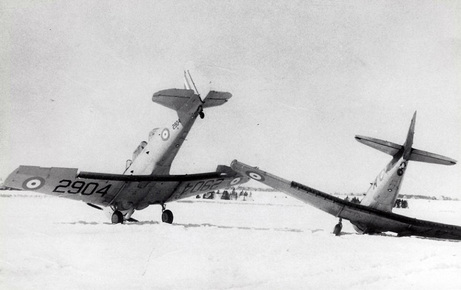 |
| Two Harvard trainers crash on the ground and wind up like this on Summerside, Prince Edward Island, Canada, 9 April 1941 (Jack McNulty Collection, Canadian Harvard Aircraft Association). |
Indian/German Relations: Subhas Chandra Bose has escaped from British-controlled India and is in Berlin. He proposes an alliance between India and Germany. India, for some reason, is often on Hitler's mind - he has proposed "giving it" to the USSR in exchange for concessions in Europe. Mahatma Gandhi supposedly also has had correspondence with Hitler, but some suspect that the letters he is supposed to have sent to Hitler were actually forgeries by British intelligence.
German Military: Hirth Motoren GmbH, being run by trustee Reichsministry of Civil Aviation, is taken over by Ernst Heinkel AG. The Hirth company makes aircraft turbojet engines, and the Air Ministry hopes that Heinkel can speed up jet engine development. Heinkel just recently, on 5 April, demonstrated his new He 280 jet engine to top Luftwaffe officials such as Ernst Udet, and Heinkel undoubtedly mentioned at that time that the jet engine problems were the only thing holding back a fleet of Luftwaffe jet fighters.
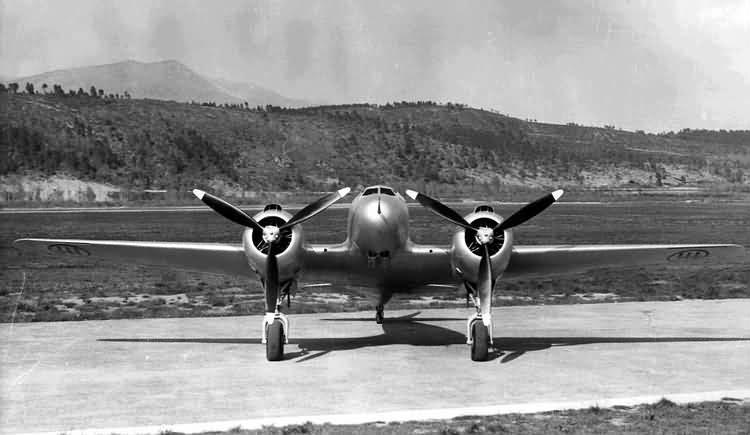 |
| A Piaggio company photograph of the P.111 at Villanova d'Albenga, Savona. |
Soviet Military: Commander of the Soviet Air Forces (VVS) Pavel Rychagov complains about the quality of the planes in the air force, calling them "flying coffins." He is referring specifically to a very high accident rate in the Air Force, but he will be confirmed correct during Operation Barbarossa in terms of their combat capabilities. Warning about these problems, however, does not insulate him from criticism, and the Politburo begins an inquiry into his claims - with Rychagov to be held responsible for any failures or problems.
Japan: Prince Hiroyasu steps down as chief of the Japanese Navy General Staff. However, he remains on the Supreme War Council, though basically he is retired. Hiroyasu is a "moderate" and has qualms about Japanese alignment with Germany via the Tripartite Pact.
China: The Japanese have been retreating from Shanggao for some time. Today is considered the end of the Battle of Shanggao, as the Japanese make it back to their main base. While the Japanese did not win the battle, they successfully kept the Chinese on the defensive and also avoided repeated attempts to surround them on the way back.
American Homefront: William Worthington passes away in Beverly Hills, California, age 69. Worthington was a star in silent films, starring, for instance, in "Damon and Pythias" (1914) and other films that were popular at the time. With the advent of talkies, Worthington's career plummeted, and he spent the last ten or so years of his career in uncredited walk-ons.
 |
| USS North Carolina is commissioned with the Brooklyn Bridge in the background, 9 April 1941. |
April 2, 1941:Rommel Takes Agedabia
April 3, 1941: Convoy SC-26 Destruction
April 4, 1941: Rommel Takes Benghazi
April 5, 1941: Rommel Rolling
April 6, 1941: Operation Marita
April 7, 1941: Rommel Takes Derna
April 8, 1941: Yugoslavia Crumbling
April 9, 1941: Thessaloniki Falls
April 10, 1941: USS Niblack Attacks
April 11, 1941: Good Friday Raid
April 12, 1941: Belgrade and Bardia Fall
April 13, 1941: Soviet-Japanese Pact
April 14, 1941: King Peter Leaves
April 15, 1941: Flying Tigers
April 16, 1941: Battle of Platamon
April 17, 1941: Yugoslavia Gone
April 18, 1941: Me 262 First Flight
April 19, 1941: London Smashed
April 20, 1941: Hitler's Best Birthday
April 21, 1941: Greek Army Surrenders
April 22, 1941: Pancevo Massacre
April 23, 1941: CAM Ships
April 24, 1941: Battle of Thermopylae
April 25, 1941: Operation Demon
April 26, 1941: Operation Hannibal
April 27, 1941: Athens Falls
April 28, 1941: Hitler Firm about Barbarossa
April 29, 1941: Mainland Greece Falls
April 30, 1941: Rommel Attacks
2020
